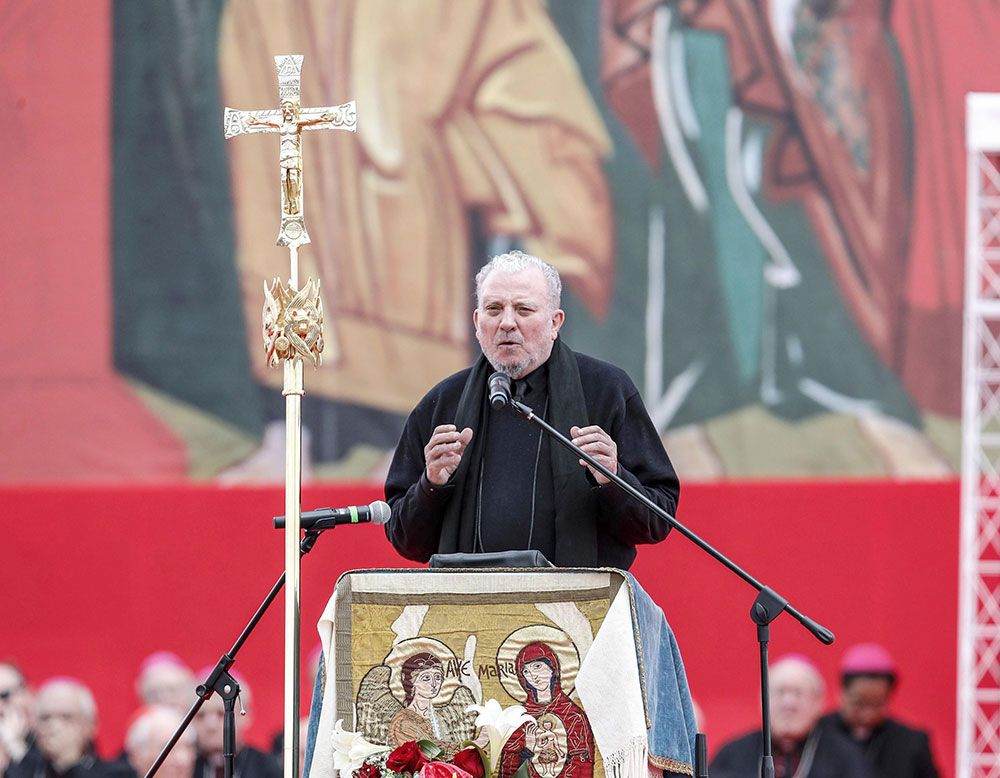A person living in the Middle East in the millennium before Christ, was bound to have a difficult time with the spiritual world. Literally, hundreds of deities, minor spirits, and gods fought for attention. Each ethnic group, often each clan, had its own pantheon. Among the gods known in the region, two stand out because of their following and their request to the faithful.
Ashtart, also known as Astarte, was a mother–goddess, out of which the most important of the Semitic deities were developed. Her name appears in the Old Testament and Solomon built a temple for her near Jerusalem. Ashtart was the goddess of fertility and sexual love. Worship before the days of the prophets may have somewhat prejudiced that of Yahweh, the only God. While we think of the Jews as monotheist – that is following only one God – the reality is that, for a long time, the Jews followed many gods. It took the work of many prophets and reformers to understand that God is one, and only one. Ashtart was a danger for Israel: it was a temptation for polytheism; because the cult to Ashtart foresaw the use of swine’s blood, it was a graphic rebuttal of God’s request for purity; since she was often considered God’s wife, this goddess simply denied one of the main pillars of Judaism.
A far worse god was Moloch. Moloch was a strong god who wanted sacrifices. During the rite of consecration, children were made to pass between two lines of fire. At times, children – especially the first child – were sacrificed to Moloch. Jeremiah and Ezekiel make the point that Yahweh never asked for human sacrifices, and that first–borns were to be consecrated to God through circumcision, not killing. All the same, there were Jews who followed Moloch – there was a temple near Jerusalem – and even others who mimicked Moloch’s cult and sacrificed their children to Yahweh!
There were also a number of Ba’al, which means ‘lords,’ for whom small temples were erected on top of the hills. The prophet Hosea speaks clearly about the moral and religious ruin caused by this cult. The shrines were little more than altars where the fruits of the earth were offered to the gods. Yet, also the Ba’al were the occasion to run away from the worship of the only true God.
The dawning of Yahweh
With time, the Jews used the names of smaller deities and applied them to Yahweh as a way of describing different aspects of Yahweh. The prophets used these names to show that Yahweh alone is the God of all. Little by little, the names of these smaller gods become some of the names of God. El–Shaddai, for instance, means God of the Mountains. Yahweh Sebaoth means the Lord of the Armies (i.e. the armies of the heavens). All the prophets called people back to the true faith in the only one God. They spoke of Yahweh as Creator, as Father and Mother. They said God is a jealous God, and we all need to be faithful to Him, and Him alone.
The prophets and, later on, the rebuilding of Israel and the religious institutions by the returnees from the exile in Babylon, started a process of renewal of the faith, but also of deep search of the meaning of God in Israel’s life. Even though rarely God is addressed as Father in the Old Testament, the theme of God’s fatherhood is present. Think of expressions like: “Then you shall say to Pharaoh, ‘Thus says the Lord, Israel is My son, My firstborn.’” (Ex. 4:22), and “O Lord, You are our Father, We are the clay, and You, the Potter; And all of us are the work of Your hand.” (Is. 64:8), or “When Israel was a youth, I loved him, and out of Egypt I called My son.” (Ho. 11:1). Israel did have an idea of being God’s first born. It was God who created and chose Israel. It was God who came to their rescue in Egypt. It was God who promised a familial relationship, deciding to reside amongst His people in Jerusalem.
Most of all, Israel was reassured of being loved by God. “For you are a holy people to the Lord your God; the Lord your God has chosen you to be a people for His own possession out of all the peoples who are on the face of the earth. The Lord did not set His love on you nor choose you because you were more in number than any of the peoples, for you were the fewest of all peoples, but because the Lord loved you and kept the oath which He swore to your forefathers, the Lord brought you out by a mighty hand and redeemed you from the house of slavery, from the hand of Pharaoh king of Egypt” (Dt. 7:6–8).
Yet, God remained a reality, both distant and dangerous. The many laws – the teachers of Israel acknowledged 613 laws in the Torah – made it almost impossible to be righteous before God. Because of this, sacrifices and other works of penance were always needed to appease God’s rage. If the idea of God’s fatherhood was present, it was still outweighed by practical experience. However, the preaching of the prophets had its impact, and the idea of God, as a loving Father, was in motion. In the later writings of the Old Testament, we see a growth of realization: Israel was becoming more confident that God was one, that He loved Israel, that He loved each person.
A new meaning of Father
Jesus, then, is not the first to see God as Father. However, He is the one who gives a new meaning to the title ‘father.’ Jesus used the word ‘Abba.’ Abba means father and it was used by children and adults alike. It could be rendered as: ‘beloved father,’ for it carries affection but also respect. It is really wrong to translate it as ‘daddy.’ In fact, it was not an endearing word, but a statement of a profound relationship. If the Jews referred to God as Father, they meant “our own Father,” that is limited to Israel. In Jesus, the word ‘father’ takes on a universal meaning. Jesus looks at God as father of the whole humanity and, in particular, father of those who accept the program of the Kingdom of God. Yahweh is not the God of one nation, but of all peoples. This is why, in the prayer of the Our Father, we cannot find any nationalistic dimension, while this is clearly present in other prayers in the New Testament (see the Magnificat or the Benedictus).
The first Christian communities understood this well. In fact, since the beginning, the name Father took the place of Yahweh Adonai in liturgical texts. Moreover, there are many documents that tell us how the Our Father was prayed together on Sundays by the whole community assembled, a community that invoked God as Father, with complete trust in Him.
This was a remarkable change in attitude. In Jewish culture, the father had complete authority over his sons and daughters. The father was the one who generated children, the mother simply developed the fetus. After all, family in Hebrew was rendered as bet’ab, the house of the father. A son had to obey his father without discussions. Philo of Alexandria, a Jewish philosopher contemporary of Jesus, wrote that it was natural for a father to be the lord of his children, as they were his servants who needed to submit to his will.
An inclusive love
Jesus needed to change, first of all, this perception of fatherhood. When He speaks of God as Father, He underlines the relationship He has with Him, which is a loving relationship. Being His Son, Jesus resembles the Father and He is now in the position to tell His followers that they also are sons of God and must have a new relationship with Him. The word ‘father’ appears 4 times in Mark, 15 in Luke, 42 in Matthew and 109 times in John.
In Matthew 5:48, Jesus says something revolutionary: “Be perfect as your Father in heaven is perfect.” To give the same flavor as in the original language, we should translate the word ‘perfect’ as ‘complete.’ Jesus is telling His followers that being sons of God, they need to become like their Father. A Father who is ‘complete’ because He loves all in equal measure. Jesus is not asking us to become divine, to take the place of God. He is inviting us to become people who are able to love others completely. To be perfect, complete, means to believe that love does not exclude anyone, that we can indeed communicate life if we love others.
Jesus does not limit our ability to call God our Father in a liturgical setting, i.e. the Our Father is not the only moment we call God in this way. His request is, instead, for a change of attitude in our way of life so that, in the process of imitating God’s behavior, we become like Him. The essential conditions to do so are presented in the Beatitudes (Mt. 5) and refer to the sharing of one’s goods and life as a way to testify God’s kingship and paternity. To call God ‘Father’ means, first of all, a social commitment. If we use the name ‘Father’ only in prayer, we betray Jesus’ message.
Lost in translation
When we proclaim the Creed, we say ‘we believe in one God, the Father Almighty.’ To understand what Almighty means, we must take a step back. Never in the Hebrew Bible God is referred to as the Almighty. This title came about because of a mistake. In 382, Pope Damasus I asked Saint Jerome to work on a new Latin translation of the Bible. Jerome, who was fluent in Greek, first worked in correcting an old version of the New Testament (from the Vetus Latina) and, in 390, after studying Hebrew, started working on the Old Testament. It took him 23 years to translate the Old Testament from the original Hebrew, and the Greek translation was known as the LXX. This text had been in use in the Church since then until recently, when translators began using the original versions to prepare new translations in modern languages.
Jerome worked alone. His fluency in biblical Hebrew was not as good as the one in Greek; it is clear that some mistakes were inevitable. One of these was the translation of the names of God. Jerome could not understand the words Sebaoth (armies) and Shaddai (of the mountains). Since he could not understand why these words were used to refer to God, he preferred translating from the Greek version he had, where often these names are translated with pantokrator. God Sebaoth means the Lord of the Armies, where armies refer to the stars and planets, which were considered living beings. El Shaddai means the Lord of the Mountains; it was the name of a deity known in Canaan, the Jews simply took the name and used it also for their God. These two names wanted to describe God as powerful, in fact in charge of the whole universe. Hence the translation in Greek: pantokrator means ‘Lord of All.’ Jerome, mistakenly translated omnipotens, the one who can do anything he likes, the All Mighty!
The question then is: Is God Almighty or not? During the Vatican Council II, the bishops’ meeting in Rome noted that many people could not believe in God because the God presented to them by the believers had little to do with the God of the Gospels. Whenever we give witness of our faith, people believe. But whenever we proclaim a God who is not good and just, then people cannot accept Him. One of these images is exactly that of an Almighty God. Many think: “if God can do anything, then he is not good!” Of course, I see many tragedies happening around me, personal tragedies and worldwide disasters, and I cannot fail to ask: “If God can do anything, and if He is good, why did He not intervene to prevent evil?” Logically, how can we justify God’s lack of intervention in our lives?
A work in progress
Some answer saying that God does not want evil, but allows it to happen. This answer explains nothing, only increases the image of a God uninterested in people’s suffering. Yet, in the Bible, we read that God hears the cry of the poor, that He heard the laments of Israel when its people were slaves in Egypt. The trouble is that the image of God we have is often far from the image God reveals of Himself. We think of a God who is judge, who wants sacrifices from us. God instead shows Himself as a Person who loves.
He created the universe to give us life, not suffering and death. Creation itself is not yet complete, as the human being is not yet complete. Because we are still on a journey, God is giving us time and space to grow. His horizon is not nearby, it is the Kingdom, which is growing but still in the making.
Evil, illness, anything that saddens our life is not part of God’s project. It is Jesus’ duty, with us, to eliminate this reality part of a Creation freeing itself to become complete as God wants. In reality, there are no barriers to our taking charge of Creation and guiding it. There are no incurable illnesses, but there are the interests of pharmaceutical companies which do not want to share the result of their research. If only we would use the strength, research and financial support we give to war and destruction, we would be able to change many realities of injustice and evil in the world.
God’s project is to give us this freedom so that we can soar and become fully human. When we proclaim to believe in the Father Almighty, we, first of all, commit ourselves to emulating Him in our lives, in loving as He does. He can do anything He likes, and He wants to empower us to shape Creation for the good of all.
















